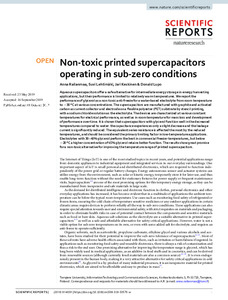Non-toxic printed supercapacitors operating in sub-zero conditions
Railanmaa, Anna; Lehtimäki, Suvi; Keskinen, Jari; Lupo, Donald (2019-10-01)
Railanmaa, Anna
Lehtimäki, Suvi
Keskinen, Jari
Lupo, Donald
01.10.2019
14059
Julkaisun pysyvä osoite on
https://urn.fi/URN:NBN:fi:tuni-201910153858
https://urn.fi/URN:NBN:fi:tuni-201910153858
Kuvaus
Peer reviewed
Tiivistelmä
Aqueous supercapacitors offer a safe alternative for intermediate energy storage in energy harvesting applications, but their performance is limited to relatively warm temperatures. We report the performance of glycerol as a non-toxic anti-freeze for a water-based electrolyte from room temperature to -30 °C at various concentrations. The supercapacitors are manufactured with graphite and activated carbon as current collector and electrode on a flexible polyester (PET) substrate by stencil printing, with a sodium chloride solution as the electrolyte. The devices are characterized at various constant temperatures for electrical performance, as well as in room temperature for mass loss and development of performance over time. It is shown that supercapacitors with glycerol function well in the decreased temperatures compared to water: the capacitance experiences only a slight decrease and the leakage current is significantly reduced. The equivalent series resistance is affected the most by the reduced temperatures, and should be considered the primary limiting factor in low-temperature applications. Electrolytes with 30-40% glycerol perform the best in commercial freezer temperatures, but below -20 °C a higher concentration of 45% glycerol retains better function. The results show great promise for a non-toxic alternative for improving the temperature range of printed supercapacitors.
Kokoelmat
- TUNICRIS-julkaisut [16977]
